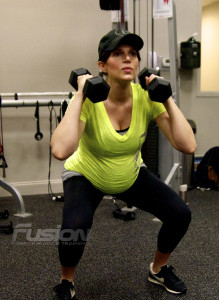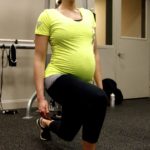
When Australian model Sophie Guidolin posted a photo of her lifting 66lbs (30k) while pregnant, the internet did NOT take this weight lightly- get it- she’s lifting “heavy” weights but the internet didn’t take it lightly…No? Okay, let’s just move on 🙂
To be honest, it’s 66lbs, Sophie clearly has lifted before, exercises regularly, so this weight is very light for her. I’m not sure why people get so upset when females lift weights, light or heavy it’s not going to make you bulky or harm you.
If anything we should be applauding her efforts to be a strong and healthy mother. She is a great inspiration for others to remain active through their pregnancy, which has proven to be beneficial for the baby, ease pregnancy related complications, and post-partum recovery.
Anecdotally, the mothers we’ve worked with had a faster delivery time. More than likely because they were stronger via pelvic floor, abdominals, overall conditioning, and their post post-partum recovery time was quicker too (excluding C-section) all thanks to resistance training!
Here’s one of our impressive clients, 8 months post-partum and stronger than previous! All thanks to maintaining a modified resistance training and exercise routine through her pregnancy.
Lifting Weights While Pregnant
For most of the population, weight lifting is absolutely amazing for them, especially the pregnant and elderly demographic. The many benefits to resistance training include increasing bone density, increase in strength, better posture, decrease risk of injury, and so on. (1)
We should all throw away the old misconceived notions that resistance training is only for big burly men and body builders, *cough fitness magazines *cough *cough…. It has so many benefits that encompasses a wide array of demographics that INCLUDE pregnant woman.
Logically, it makes sense to maintain some form of resistance training during pregnancy to fight off other complications. Maintaining your strength through resistance training can help:
- Minimize Back Pain: Thanks to a strong “core” and upper back, you’ll have less back pain from the extra weight pulling you forward.
- Ease Daily Activities: Maintaining your leg, back, and core strength and conditioning can help ease daily activities such as going up stairs, getting off the couch, etc…
- Postnatal Recovery: the stronger you are throughout the pregnancy the easier it will be to bounce back to form.
Benefits of Resistance Training for Pregnant Woman
You maybe thinking that so far we’ve mainly mentioned anecdotally references, so if you’re still skeptical, let’s go over a some scientifically backed research to help minimize the fear of resistance training for pregnant women.
Controlled Maternity Weight Gain
With a proper diet and resistance training program, the mother can gain a healthy amount of weight for her and the baby. This can help off-set potential risks of gestational diabetes, other pregnancy and labor related complications, and have an easier time “bouncing back” after giving birth.
Positive Self Image
The many changes that comes with pregnancy has shown to have a reduced sense of body image (6,7).
“Marquez-Sterling et al. (8) found that women who exercised during pregnancy had a significantly better body image than non-exercisers, a trend that extended into the latter stages of pregnancy. Moreover, Boscaglia et al. (10) reported that pregnant women who exercised at least 90 minutes a week at moderate intensity were significantly more satisfied with their bodies throughout the term than low exercisers. The authors concluded that women who participate in neonatal fitness programs respond more favorably to pregnancy-related changes in their bodies compared with women who remain sedentary” (9)
Healthy For the Baby
“Studies have indicated that there are no differences in birth measures (e.g., birth weight, length, Apgar scores) between babies born to mothers who practiced maternal strength training (4,5) and those who did not, respectively. However, there was a dose response trend toward improved Apgar scores in babies whose mothers participated in greater amounts of strength training, coupled with aerobic exercise9 . Preliminary findings indicate that maternal participation in intermittent activity (strength training, yoga) is associated with improved fetal cardiac autonomic control (May LE, Suminski RS, Gustafson KM, unpublished data, 2012).” (3)
Gestational Diabetes
Exercise in general has shown to diminish the risk of gestational diabetes, especially for the already overweight or obese women.
Jovanovic-Peterson et al and Bung P et research shows that exericse is a “helpful adjunctive therapy” for gestational diabetes mellitus when euglycemia is not achieved by diet alone (2,11).
Conclusion:

It’s very apparent that resistance training and exercise has many positive physical and psychological benefits for the mother and the baby. The fear and negative connotation of woman staying strong and taking care of her OWN bodies should never be an issue to anyone.
In the end, Sophie is spot on “Each pregnancy is different & exercises that I or anyone else may be doing may not be safe for your body to perform. I… still believe it comes down to each individuals fitness, pregnancy and circumstances”. We talk more about prenatal training guidelines HERE.
To conclude, we believe that everyone should choose the form of exercise that they feel is beneficial for their own body but they should be able to make an informed decision based on evidence not opinions. Weight training has shown time and time again that it is very beneficial for a multitude of demographics, including maternal.
More About Sophie’s Reaction: CLICK HERE
Fusion Prenatal Training Guidelines: CLICK HERE
Fusion Postpartum Training Guidelines: CLICK HERE
Stay strong and informed!
References:
- https://www.acsm.org/docs/current-comments/rtandip.pdf
- Jovanovic-Peterson L, Peterson CM. Exercise and the nutritional management of diabetes during pregnancy. Obstet Gynecol Clin North Am 1996;23:75–86
- May, Linda “Part 2: Resistance Training During Pregnancy.” January-March, 2012 Volume 22: Issue 1: 04-05. American College of Sports Medicine.
- Barakat R, Lucia A, Ruiz JR. Resistance exercise training during pregnancy and newborn’s birth size: a randomised controlled trial. International journal of obesity. 2009;33(9):1048-57.
- Hall DC, Kaufmann DA. Effects of aerobic and strength conditioning on pregnancy outcomes. Am J Obstet Gynecol. 1987;157(5):1199-203.
- Moore DS. The body image in pregnancy. J Nurse Midwifery 22: 17–27, 1978.
- Strang VR and Sullivan PL. Body image attitudes during pregnancy and the postpartum period. J Obstet Gynecol Neonatal Nurs 14: 332–337, 1985.
- Marquez-Sterling S, Perry AC, Kaplan TA, Halberstein RA, and Signorile JF. Physical and psychological changes with vigorous exercise in sedentary primigravidae. Med Sci Sports Exerc 32: 58–62, 2000.
- Schoenfeld, Brad. Resistance Training During Pregnancy: Safe and Effective Program Design. NSCA Strength and Conditioning Journal. Vol 33: 68-75. 2011.
- Boscaglia N, Skouteris H, and Wertheim EH. Changes in body image satisfaction during pregnancy: A comparison of high exercising and low exercising women. Aust N Z J Obstet Gynaecol 43: 41–45, 2003.
- Bung P, Artal R. Gestational diabetes and exercise: a survey. Semin Perinatol 1996;20:328–333.

 About the Author
About the Author






Speak Your Mind